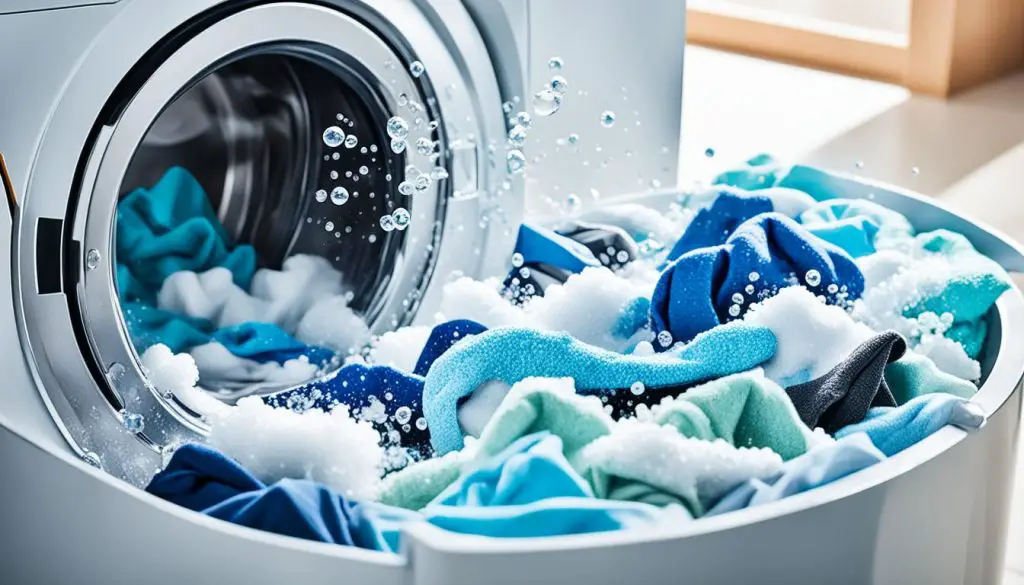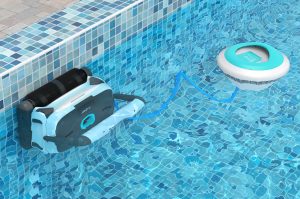No one likes a smelly washing machine, but with a few simple steps, you can banish odors and enjoy a cleaner, scent-free laundry experience. Whether you have a front-load or top-load washer, proper cleaning and maintenance are essential to prevent smells caused by mold, mildew, and soap scum buildup. In this article, we will provide you with detailed instructions on how to clean a smelly washer and share tips for prevention.
Key Takeaways:
- Regular cleaning and maintenance are essential to prevent a smelly washing machine.
- Front-load and top-load washing machines differ in their design and susceptibility to smells.
- Follow a step-by-step guide using household items like bleach, baking soda, and vinegar to combat odors.
- Preventive measures, such as leaving the washer door open and using high-efficiency detergents, can help keep your machine smell-free.
- Understanding the causes of smelly washing machines can help you prevent odors and enjoy fresher laundry.
Front Load vs Top Load: Understanding the Differences
When it comes to washing machines, there are two popular options: front load and top load. Understanding the differences between these two types of machines is essential for maintaining cleaning quality and efficiency while tackling the issue of smells.
Front-loaders are known for their superior cleaning quality and energy efficiency. They use less water and high-efficiency detergents, resulting in cleaner and more environmentally friendly laundry. However, this design also makes them more susceptible to smells caused by soap scum buildup, mold, and mildew.
Also read: How Much Water Does a Washing Machine Use?
Top loaders, on the other hand, may not offer the same level of cleaning quality and energy efficiency as front loaders, but they are less prone to smells. The design of top-loading machines allows for better ventilation, preventing the accumulation of dirt and debris that can lead to unpleasant odors.
| Criteria | Front Load | Top Load |
|---|---|---|
| Cleaning Quality | Superior | Good |
| Efficiency | High | Standard |
| Smell Susceptibility | High | Low |
Front-load and top-load washing machines have their own advantages and disadvantages. While front loaders excel in cleaning quality and efficiency, they require extra care to prevent smells. Top loaders may not offer the same performance, but they are less prone to odors.
To combat smells in front load machines, it’s important to regularly clean the drum and rubber door gasket to remove any dirt and debris that accumulates. Using specialized cleaners and running hot water cycles can help eliminate soap scum, mold, and mildew. On the other hand, top-load machines benefit from regular ventilation and simple maintenance to prevent smells from occurring.
By understanding the unique characteristics of front load and top load washing machines, you can take the necessary steps to maintain cleaning quality, efficiency, and a fresh laundry experience.
Step-by-Step Guide: How to Clean a Smelly Washer
To eliminate the unpleasant smell in your washing machine, follow this step-by-step guide:
Start by gathering the necessary materials, including bleach, baking soda, vinegar, rubber gloves, an old toothbrush, and optional essential oil. The process involves scrubbing the soap, bleach, and fabric softener dispensers, as well as cleaning the drum using bleach and a high-temperature wash cycle. Baking soda and vinegar are then used to remove any remaining dirt and grime, leaving your washer odor-free. It’s important to take precautions and follow the instructions carefully to ensure effective cleaning.
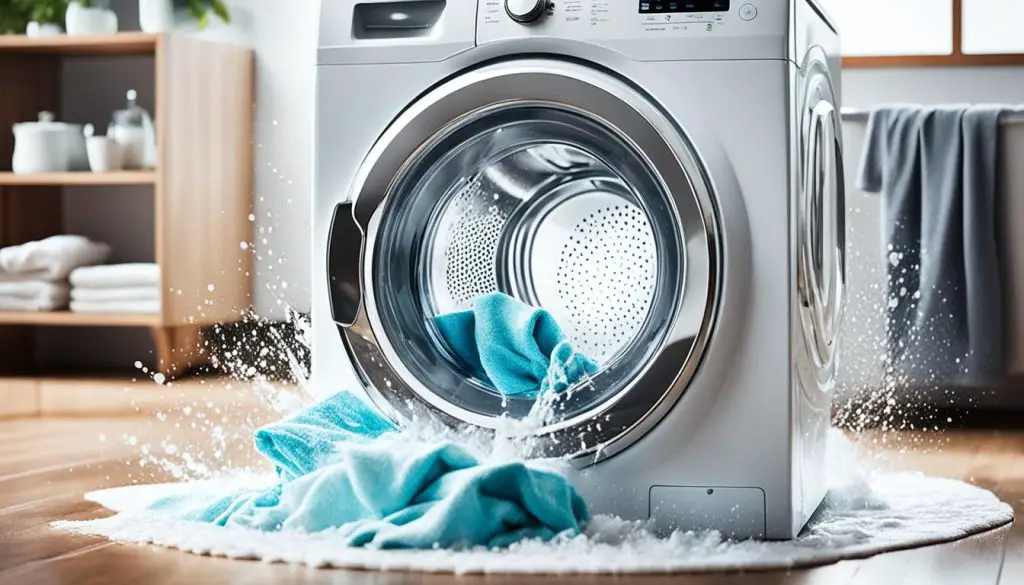
Materials Needed:
- Bleach
- Baking soda
- Vinegar
- Rubber gloves
- Old toothbrush
- Optional essential oil
Instructions:
- Put on rubber gloves to protect your hands from cleaning agents.
- Remove any clothes or items from the washing machine.
- Scrub the soap, bleach, and fabric softener dispensers with a toothbrush to remove residue.
- Prepare a cleaning solution by mixing 1/2 cup of bleach with 1/2 cup of water.
- Wearing gloves, use a cloth or sponge soaked in the bleach mixture to clean the inside of the drum.
- Run a hot water wash cycle with bleach to sanitize the machine. Refer to the manufacturer’s instructions for the recommended water temperature.
- After the bleach cycle, repeat the process with 1/2 cup of baking soda instead of bleach to neutralize odors and remove stains.
- For a natural alternative, replace the baking soda with white vinegar. Run a hot water cycle with 2 cups of vinegar.
- Lastly, wipe down the drum, door, and seal with a clean, damp cloth to remove any remaining residue.
- Leave the washing machine door open to allow it to air dry completely.
Tips:
To enhance the scent of your freshly cleaned washing machine, add a few drops of essential oil to a cloth and place it inside the drum before running a dry cycle. This will leave a pleasant aroma on your freshly laundered clothes.
Precautions:
Always wear rubber gloves when handling cleaning agents to protect your skin. Ensure proper ventilation in the laundry area when using bleach or vinegar. Follow the manufacturer’s instructions for your specific washing machine model to prevent damage. If you have any concerns or questions about cleaning your washing machine, consult the manufacturer’s manual or contact their customer support.
Prevention Tips: Keeping Your Washer Smell-Free
Once you have cleaned your smelly washer, it’s essential to follow preventive measures to keep it odor-free. By incorporating these prevention tips into your laundry routine, you can avoid the hassle of dealing with a smelly washing machine in the future.
- Leave the washer door open between washes to allow excess moisture to evaporate. This helps prevent the growth of mold and mildew, which can lead to unpleasant odors.
- Use high-efficiency detergents specifically designed for your washing machine. These detergents are formulated to minimize soap scum buildup and keep your washer clean.
- Regularly clean the gasket seal of your washing machine. This area is prone to dirt and debris accumulation, which can contribute to foul smells. Wipe the seal with a damp cloth or sponge to remove any buildup.
- Make use of your washing machine’s Autowash feature, if available. Running this cycle every few months helps maintain optimal performance and keeps your washer smelling fresh.
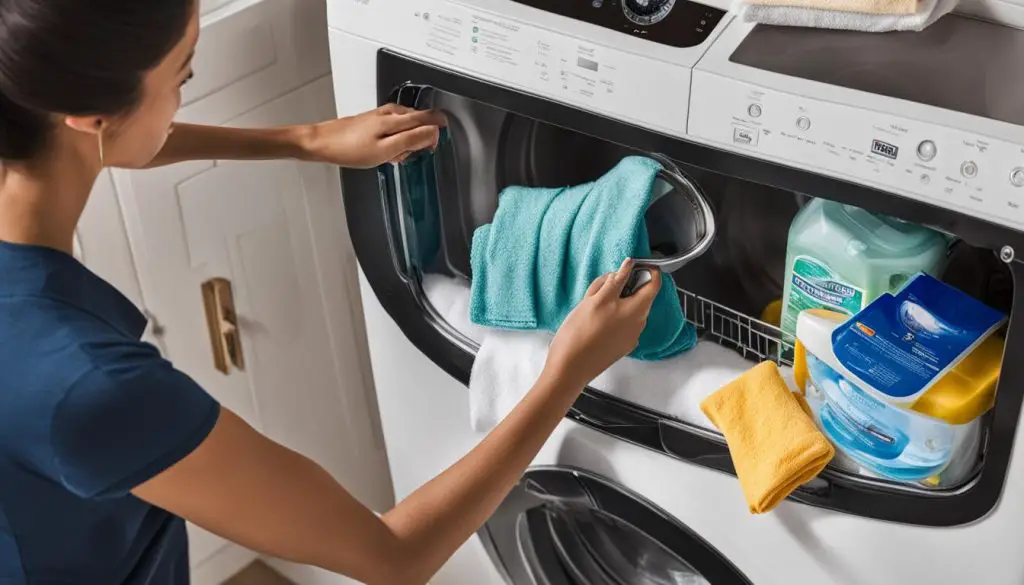
Understanding the Causes of Smelly Washing Machines
Smelly washing machines can be caused by various factors that contribute to unpleasant odors in your laundry. By understanding these causes, you can take proactive measures to prevent odors and maintain a fresh, clean laundry experience.
One common cause of a smelly washing machine is the buildup of dirt and detergent residue over time. As you wash loads of laundry, small particles of dirt, lint, and soap can accumulate inside the machine. This buildup provides a breeding ground for bacteria and can lead to unpleasant smells. Regular cleaning of your washing machine can help prevent this issue.
Another culprit behind smelly washing machines is the growth of mold and mildew in the water chambers. Moisture and warmth inside the machine (including the drain pipe) create an ideal environment for mold and mildew to thrive. These fungi release musty odors and can even cause health issues if left unchecked. Regularly cleaning and drying your washing machine can mitigate this problem.
Fabric softener residue can also contribute to a smelly washing machine. While fabric softeners help make clothes feel and smell fresh, excessive use or improper rinsing can result in a buildup of residue on clothes and inside the machine. Over time, this residue can become stagnant and create unpleasant odors. Using fabric softeners sparingly and ensuring proper rinsing can prevent this problem.
Here’s a summary of the causes of smelly washing machines:
| Causes | Solutions |
|---|---|
| Dirt and detergent residue buildup | Regular cleaning of the washing machine |
| Mold and mildew growth | Regularly cleaning and drying the machine |
| Fabric softener residue | Using fabric softeners sparingly and ensuring proper rinsing |
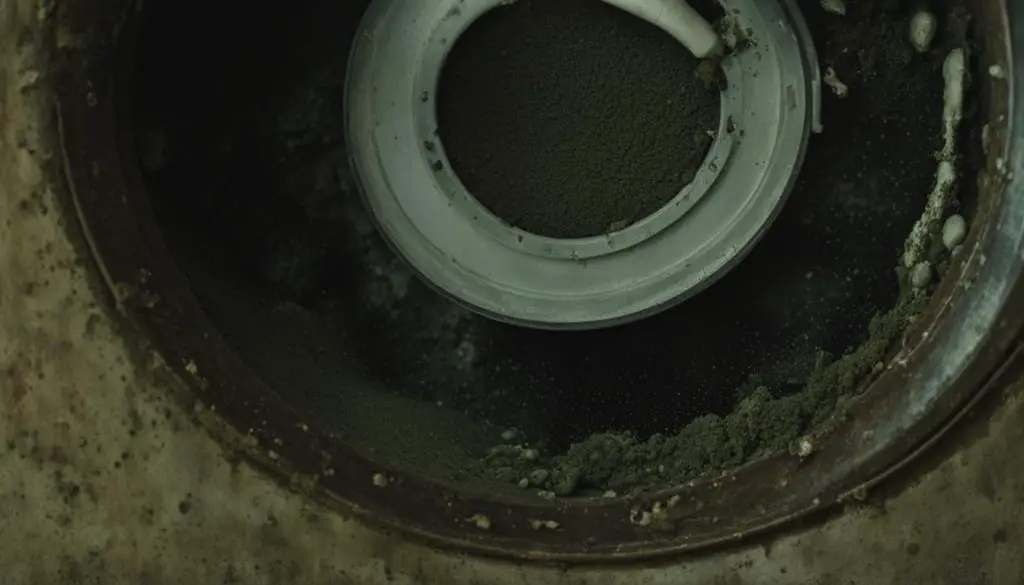
Conclusion
Dealing with a smelly washing machine can be a frustrating ordeal, but don’t worry, with the right knowledge and proper maintenance, you can eliminate those unpleasant odors and enjoy fresh, clean laundry every time.
Remember to regularly clean your machine, paying attention to the soap, bleach, and fabric softener dispensers, as well as the drum and rubber door gasket. Use high-quality detergents to maintain a fresh laundry experience, and consider adding some optional essential oil for a delightful scent.
FAQ
How often should I clean my washing machine?
It is recommended to clean your washing machine at least once a month to prevent odors and maintain optimal performance.
What materials do I need to clean a smelly washer?
To clean a smelly washer, you will need bleach, baking soda, vinegar, rubber gloves, an old toothbrush, and optional essential oil.
Can I use regular detergent to clean a smelly washer?
No, it is best to use high-efficiency detergents specifically designed for front-load washers to prevent soap scum buildup and odors.
How long should I leave the washing machine door open?
It is recommended to leave the washing machine door open between washes to allow excess moisture to evaporate. It is best to leave it open for a few hours or overnight.
How can I prevent a smelly washing machine?
To prevent a smelly washing machine, you should use high-efficiency detergents, clean the gasket seal regularly, and run an Autowash cycle every few months.
Can I use fabric softener in my washing machine?
Yes, you can use fabric softener, but it is important to use only the necessary amount to avoid residue buildup that can contribute to odors.
What causes a washing machine to smell?
Smells in washing machines can be caused by dirt and detergent residue buildup, mold and mildew growth, and fabric softener residue left on clothes.
How do I clean the soap and fabric softener dispensers?
To clean the soap and fabric softener dispensers, remove them from the washing machine and scrub them with a mixture of bleach and water. Rinse them thoroughly before reinserting them.
Do I need to clean my top-load washing machine as often as a front-load one?
While front-load washing machines are more prone to developing smells, it is still important to regularly clean and maintain top-load washers to prevent odors and keep them functioning properly.

